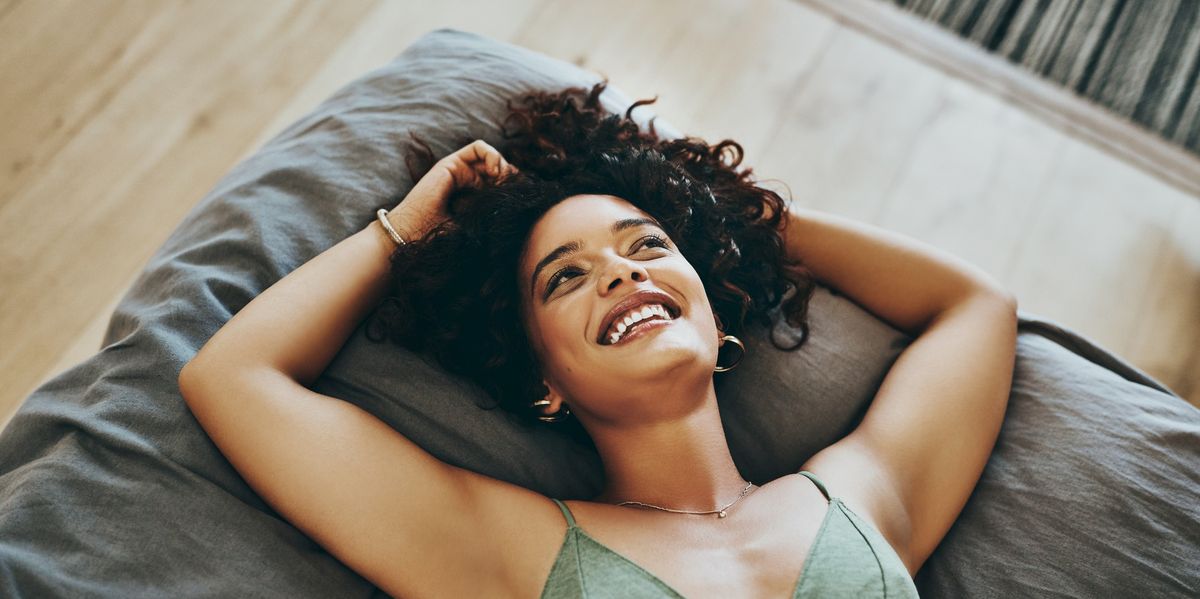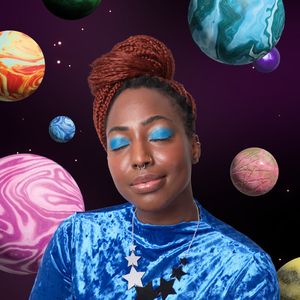
Better Off Braless: The Benefits Of Not Wearing A Bra More Often
Somewhere between the start of the pandemic and entering the late stages of my 20s, bras become less and less of a priority.
Within that span of time, I, like most of the world, spent my days inhabiting my small bubble, staying in the house with loose-fitting loungewear, and being on Zoom calls that only required me to be presentable from the neck up. So as the demand to have my breasts at their perkiest form, so did my commitment to wearing bras.
The relationship that most women have with their bras is… well, complicated. While society has led us to believe that they’re required for us to be deemed as “ladylike” and “neat,” many of us find the garment to be a bothersome (and optional) accessory at best.
From underwires that poke and dig at our sides to push-ups that spill over, the argument in support of bras has begun to wane over the last few decades, with women of all cup sizes asking themselves if it’s better to just go braless.

Courtesy of Harper Wilde
“Many years ago, I ditched wired bras and opted for going braless out of a desire for freedom and celebrating natural human form,” multi-hyphenate Alyson Stoner tells xoNecole. The movement activist best known for their fly dance moves with the likes of Missy Elliott and on Step Up 2: The Streets, shares that when it comes to their bra selection, comfort is key. “As someone who enjoys moving their body, I found that I do want an underlayer that provides some support without interfering with comfort and mobility.”
A source of concern when choosing to go braless is whether or not the lack of support from a bra will, in turn, affect the firmness of one’s breast, resulting in early sagging. However, Sabrina Sahni, M.D., an oncologist at Mayo Clinic in Florida, shares that breast sagging is a result of age, not whether you’ve ditched your bras.
“Sagging breasts – also called ptosis – generally occurs due to chronic aging,” she tells xoNecole. “The breast is made up of a combination of glandular and fibrous tissue and fat tissue. Over time, the glandular tissue may become replaced with fattier tissue, and that can lead to more sagging. Wearing a bra or not wearing a bra ultimately does not change that.”
"Wearing a bra or not wearing a bra ultimately does not change that."
Women with heavier breasts may find that going braless may have its set of drawbacks, but Dr. Sahni says that you should always pay attention to your comfort levels since bras are a garment designed to support your back and correct your posture. “Those with heavier or larger breasts who choose to go braless may actually have worsening back/neck/shoulder pain,” she says. “Wearing a bra may allow them to correct their posture and help alleviate tension on those muscle groups.”
“Women with larger breasts may benefit from wearing a well-fitted, supportive bra as it may alleviate things like upper back pain or neck pain,” she shares.
Listening to your body is key when choosing whether you want to toss out your bras forever or just for a day. The beauty in a woman’s body is that it will tell us what we need to know before we even have to ask. There are common misconceptions about tighter bras being linked to causing health issues like breast cancer.
And while studies do show that Black women are “twice as likely to be diagnosed with breast cancer early when compared with Caucasian women,” the manifestation of this disease is predetermined by other varying factors.
“There are a lot of myths out there about going braless being better for breast cancer risk. It is completely false,” Dr. Sahni explains. “Whether or not you wear a bra does not have any bearing on your overall breast cancer risk. Ultimately, your risk is dependent on a variety of factors, including family history, your breast density, your lifestyle, and your reproductive history.”
If you’re looking for classic, weightless comfort that’s close to going braless, Alyson Stoner recommends Harper Wilde, a body-inclusive intimates brand on a mission to create a more comfortable world for womankind. They currently have a capsule collection with the intimates brand in partnership with their company, Movement Genius.
“Harper Wilde has been my go-to for years now because the materials are truly soothing on my sensitive skin, the amount of support feels like you're being gently hugged (not squeezed), and the styles are flattering and beautiful enough to wear as shirts or visible layers,” they say.

Courtesy of Harper Wilde
The brand offers super soft, breathable cotton fabric in their Triangle and Scoop Bralettes ($40 each) that will put the bliss and comfort back in your bosom.
Dr. Sahni says that choosing to opt out of bras or keep them close to your chest “truly depends on the individual” but it should be understood that “wearing or not wearing a bra won't significantly impact your overall health.”
“Ultimately, it comes down to comfort. There are some women with chronic breast pain where perhaps changing their bras to something more supportive and well-fitted may help,” she says. “Alternatively, some women find that going bra-less will alleviate their breast pain. I tell women that they should choose a bra that is comfortable for them, feels supportive, and one that they can wear regularly.”
So whether you choose to free the tatas or wear a bra that feels like it’s barely there, remember to listen to your body because ultimately, the choice is yours.
Let’s make things inbox official! Sign up for the xoNecole newsletter for daily love, wellness, career, and exclusive content delivered straight to your inbox.
Featured image by Delmaine Donson/Getty Images
Aley Arion is a writer and digital storyteller from the South, currently living in sunny Los Angeles. Her site, yagirlaley.com, serves as a digital diary to document personal essays, cultural commentary, and her insights into the Black Millennial experience. Follow her at @yagirlaley on all platforms!
ItGirl 100 Honors Black Women Who Create Culture & Put On For Their Cities
As they say, create the change you want to see in this world, besties. That’s why xoNecole linked up with Hyundai for the inaugural ItGirl 100 List, a celebration of 100 Genzennial women who aren’t afraid to pull up their own seats to the table. Across regions and industries, these women embody the essence of discovering self-value through purpose, honey! They're fierce, they’re ultra-creative, and we know they make their cities proud.
VIEW THE FULL ITGIRL 100 LIST HERE.
Don’t forget to also check out the ItGirl Directory, featuring 50 Black-woman-owned marketing and branding agencies, photographers and videographers, publicists, and more.
THE ITGIRL MEMO

I. An ItGirl puts on for her city and masters her self-worth through purpose.
II. An ItGirl celebrates all the things that make her unique.
III. An ItGirl empowers others to become the best versions of themselves.
IV. An ItGirl leads by example, inspiring others through her actions and integrity.
V. An ItGirl paves the way for authenticity and diversity in all aspects of life.
VI. An ItGirl uses the power of her voice to advocate for positive change in the world.
Let’s make things inbox official! Sign up for the xoNecole newsletter for daily love, wellness, career, and exclusive content delivered straight to your inbox.
When discussing the topic of raising children, discipline is often the first thing that comes to mind. Children need discipline. Full stop. But what is discipline? And how do we draw the line between discipline and revenge?
The origin of the word "discipline" can be traced back to the Latin word "disciplina," which means "instruction" or "teaching." Over time, however, discipline has come to be synonymous with punishment, with parents relying on shame, fear, and/or physical pain to curb undesirable behavior.
Teaching takes time, so nipping it in the bud in whatever fashion parents deem necessary (within reason) has become the norm. But is this what’s best for children? And when does it become less about curbing undesirable behavior and more about getting our licks back for offenses we feel our children should know better to do?
In my work as a parenting coach, I’ve often heard parents say, “I asked him nicely three times before spanking him. He didn’t stop doing it until I did, so clearly talking doesn’t work.”
And the parent isn’t wrong. Talking often doesn’t work the first, the third, or the even the 10th time. And the reason is directly tied to brain development.
Children cannot and do not process information the way an adult can. Auditory processing is not fully developed until a child is 14 or 15 years old. And even then, if a child has auditory processing delays or Auditory Processing Disorder (APD), they may always struggle with processing auditory commands. According to Susie S. Loraine, MA, CCC-SLP, the term auditory processing refers to how the brain perceives and interprets sound information. Several skills determine auditory processing ability—or listening success. They develop in a general four-step hierarchy, but all work together and are essential for daily listening.
Without this understanding, discipline can easily become revenge because parents will then view their child’s misdeeds as a personal slight. Instead of teaching them to do better, parents now want to show them the consequences of not doing better. This is why it's imperative for parents to discern between discipline and revenge to maintain healthy relationships with their children.
5 WAYS TO DISTINGUISH BETWEEN PARENTAL GUIDANCE AND RETALIATION:
Understanding The Intent
Discipline is rooted in love and concern for the child's well-being. It focuses on teaching lessons and helping children understand the consequences of their actions. Conversely, revenge-driven actions stem from a desire to inflict pain or punishment as payback for perceived slights or disobedience. Parents should reflect on their motives before taking disciplinary actions. Ask yourself whether your intention is to help your child learn or to make them suffer for upsetting you.
Example: If a child accidentally breaks a valuable item, a disciplinary response would involve discussing the importance of being careful and working with the child to come up with a way to replace or fix what they’ve broken. On the other hand, a vengeful reaction might involve yelling, harsh punishment, or bringing up past mistakes to intensify guilt.
Maintaining Emotional Regulation
Effective discipline requires parents to remain calm and composed, even in challenging situations. It's natural to feel upset or frustrated when children misbehave, but responding with anger or resentment can escalate the situation and blur the line between discipline and revenge. Before addressing the issue, take a moment to breathe and collect your thoughts.
Example: If a child cannot follow instructions, a disciplined response would involve calmly explaining why their cooperation is necessary in working with the child to accomplish the goal. Conversely, a retaliatory response might involve shouting, name-calling, or resorting to physical punishment out of anger.
Promoting Growth and Learning
Discipline should always aim to promote growth and learning. It involves guiding children toward making better choices and understanding the impact of their actions on themselves and others. Effective discipline strategies include positive reinforcement, setting clear expectations, and providing opportunities for reflection and growth.
Example: If a child repeatedly forgets to complete their chores, a disciplinary approach would involve discussing the importance of responsibility and finding solutions together, such as creating a chore chart or setting reminders with Siri or Alexa. In contrast, a revenge-driven response might involve imposing overly harsh punishments or belittling the child, which can undermine their self-esteem and hinder their ability to learn from their mistakes.

Momo Productions/Getty
Building Trust and Communication
Trust and open communication are essential components of a healthy parent-child relationship. Discipline should strengthen this bond by fostering trust and encouraging children to confide in their parents without fear of judgment or retaliation. When children feel safe and supported, they're more likely to accept discipline as a form of guidance rather than punishment.
Example: If a child admits to breaking a rule or making a mistake, a disciplined response would involve listening to their perspective, discussing the consequences of their actions, and working together to find a solution. Conversely, a retaliatory response might involve accusations, blame, or shutting down communication, which can erode trust and damage the parent-child relationship.
Seeking Professional Guidance
Parenting is a learning journey, and, disciplining children is a delicate balance between guiding them toward responsible behavior and nurturing their growth. By understanding the intent behind our actions, maintaining emotional regulation, promoting growth and learning, building trust and communication, and seeking professional guidance when needed, as parents we can help our children built on love, respect, and understanding.
Let’s make things inbox official! Sign up for the xoNecole newsletter for love, wellness, career, and exclusive content delivered straight to your inbox.
Featured image by Courtney Hale/Getty Images









